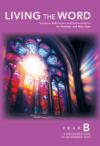Praying for Mercy
Thirtieth Sunday in Ordinary Time
Sirach 35:12–14, 16–18 / Psalm 34:7a / 2 Timothy 4:6–8, 16–18 / Luke 18:9–14
<< Back to LECTIONARY RESOURCES
Reflecting on the Word
By Rev. James A. Wallace, C.Ss.R.
There is a funny song in the highly irreverent musical The Book of Mormon. One of the two young Mormons being sent as a missionary to Uganda is a real “golden boy” with genuine expectations of doing great things. When he is paired up with a less prepossessing fellow named Callahan, he sings a song predicting the great things they will do. The song’s title is “It’s You and Me—But Mostly Me.”
The prayer of the Pharisee falls into this category. It is not a bad prayer, we are told. The Pharisee stands before God in gratitude for many blessings. But the focus quickly shifts to “I . . . I . . . I . . . I . . . ” It is the simple prayer of the tax collector that wins God’s heart. Note how Jesus expresses it: “the latter went home justified.” To be justified is to be in right relationship with God; it is a gift of God. Asking that God be merciful puts us in right relationship with God.
We can make our own several prayers found in Luke’s first two chapters. Consider the prayer of Mary upon hearing Elizabeth’s words of greeting (1:46–55), the prayer of Zechariah at the birth of John the Baptist (1:68–79), and the prayer of Simeon in the temple when he takes in his arms the Christ Child (2:29–32). Each keeps our focus on God as a God of justice and mercy. Each calls us to bow our heads humbly in recognition of who we are and who God is.
Consider/Discuss
- Does God really want us bowing our heads and beating our breasts?
- Where is the line between self-acceptance, self-esteem, and self-absorption?
Responding to the Word
When I am tempted to be boastful in my prayer, O God, help me to recall that I always stand before you as a sinner.
